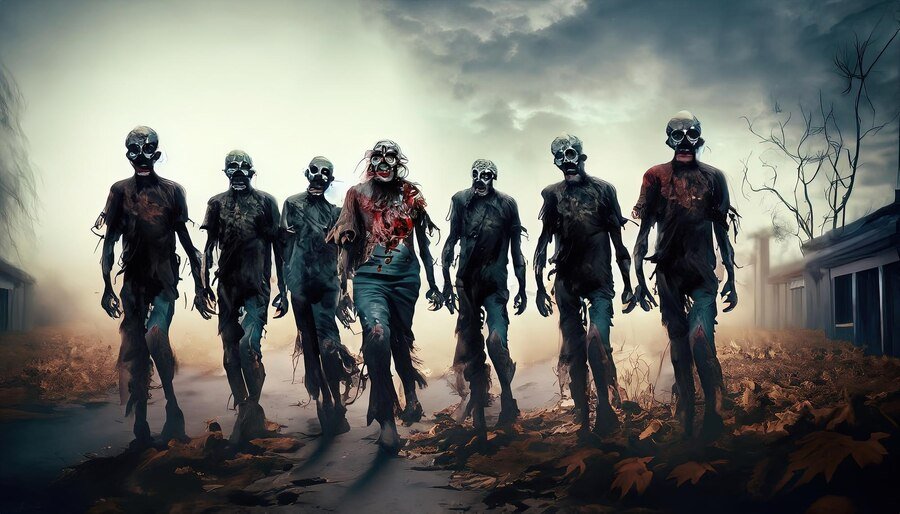Survival, Strategy, and Scares: The Appeal of Zombie Games in Modern Gaming
Zombie games have been a fixture in the minds of video game players for years, dealing with haunting post-apocalyptic environments and high anxiety-stakes survival situations. There are practically dozens of games out there set in waste, but many look beyond zombies and shooty guns to deliver engaging survival experiences revolving around action, strategy, and horror wrapped up in a bloody gore-coated genre. With this review we will try to reveal to you the design and deep secrets of zombie games, We also dive into a short historical journey and list some of the best titles that were released during our history.
The Undying Appeal of Zombies in Gaming
Ultimately, zombie games are a reflection of mankind waging war against an endless and insatiable horde. That theme is something that hits players in the gut, and it presents a challenge unlike any first-person shooter or strategy game before. The zombie as an adversary is iconic slow, dumb, and in general great numbers. It is this blend of these that makes the player act spontaneously, ration, and strategize respectively. Be it securing windows in a small cabin or searching for bits of food and ammunition throughout a ruinous city, you are never left with even perusing the tension.
This perpetual proximity of danger along the lines that come with strategic gaming makes zombie games automatically replayable. Depending on decisions made, locations explored and exactly how the undead threat is dealt with each playthrough can be altered quite drastically. The narrative framing helps with that too players are not lucky enough to be fighting zombies exclusively, but instead they now get the ghouls along with emotional storylines of loved ones, humanity crumbling, and rebuilding hope in a world where there is sometimes none.
The Evolution of Zombie Games: From Arcade Shooters to Open-World Survival
While zombie games have evolved a lot from their inception. Early games such as Zombie Zombie (1984) and Ghosts ‘n Goblins (1985) offered limited gameplay features with 8-bit graphics, serving wave combat where scores of undead either shuffled or chased the player. Initially, these were fairly straight-line shooter games with a narrative not quite as deep as modern titles or the ‘survival’ element.
Then the genre started to change in the late ’90s, and early 2000’s. Resident Evil: The Dead Shall Rise (1996): The original Resident Evil combined survival horror with elements of puzzles and told a story that revitalized the zombie game. As they dug deeper, players had limited resources such as ammunition and health to manage during intense fights in narrow corridors with intricate puzzles thrown into the mix accompanied by a larger conspiracy that wrapped itself around an entire virus outbreak. This formula became a template for many zombie games to come, and the franchise is still one of the most recognizable in gaming.
The game was the first to incorporate survival with storytelling and other games soon followed suit. Left 4 Dead (2008) combines real co-op game modes where up to four players could team up against incredibly well-designed, objective-based maps with zombie hordes ambushing from all directions. At its core, this game was team-based and teamwork meant you could also talk to your teammates a more chaotic action-oriented version of the genre.
Increasingly, zombie games have been set in open-world environments allowing players to explore large and dangerous post-apocalyptic landscapes. Games such as Dying Light (2015) and Days Gone(19), perpetrated dynamic day-night cycles, fortification systems//alcohols/health potions/Panadol’s/skill trees in open-world exploration environments that were drawn up -ultimately increasing the ante of enduring. These are highly absorbing games that allow players to forage, carve out sanctuaries, and pick moments to fight or flee from the undead tide.
Standout Titles That Define the Genre
For some, zombie games have transcended that barrier – a number of them embody innovation and even challenge the test of time. Here are some of the best:
1. Resident Evil Series: As mentioned earlier, the Resident Evil series was more or less pivotal in starting this survival horror ball rolling by intertwining complex narrative with challenging gameplay. Games like Resident Evil 2 Remake (2019) must walk the tightrope between updating a classic series and keeping that same sense of tension and resource management in the game.
2. The Last of Us: The Last of Us (2013) and its sequel are not your classic zombie games, but you can also find some very flesh, human-like infected that won´t make the game easier for you. Game Description: The Soul Cage An Innovative Story Campaign With a character-driven story about the perils of surviving in such an environment, it’s easily one of the best games from this genre.
3. Dying Light: This game brought parkour mechanics to the zombie genre, offering gamers a chance to leap rooftops and maneuver in town whilst dodging flesh eaters. A day-night cycle only serves to make matters more complicated since zombies are quicker and deadlier at night.
4. World War Z: Based on the movie of the identical name, World War Z (2019) focuses more closely than previous video game adaptations the rapid cooperative gameplay. These undead mass in force, like a swarm that climbs walls and overruns the player with pure numbers.
5. State of Decay 2: The open-world survival title features a strong focus on community building and resource management. Players will need to recruit survivors, establish and improve a base of operations, and loot supplies while fighting off the zombie hordes. All of this means that every decision in the game has consequences, something which is already true, to begin with as a roguelike but many times more so given said full permadeath.
6. Call of Duty: Zombies: Zombies A perennial Call of Duty staple, the Zombies mode presents a tight blend of high-velocity shooting and co-op competition. As time passes, this mode has included complicated plots along with large-scale maps and interesting weapons that have kept its players hooked on every new game.
The Future of Zombie Games: Innovation and Expansion
However, zombie games have no plans to slow down. Leaps in gaming technology, especially AI and how the environments you interact with operate, could lead to technological pushes for this genre. Ideally, developers will add some frequently more clever zombies that can learn players’ tendencies and evolve brain strategies to keep every encounter uncertain. In the same way, an even greater moveability can be promoted towards large-scale interconnected open-worlds that require or encourage co-op-based gameplay for survival in a world ravaged by zombies and warring factions both ai-controlled enemy human settings.
Using virtual reality (VR) may well be the next big thing for zombie games. Games like The Walking Dead: Saints & Sinners (2020) have demonstrated the way in which VR can be an ideal platform to transport players into this harrowing realm of flesh-eating fiends. Eventually, as VR gets better we will only become able to have even more visceral zombie experiences of this type where you actually need to duck and weave or punch out zombies.
Conclusion
Zombie-based games returned to basics, transformed from nifty simple arcade shooters (ie House of the Dead) into massive complex narrative-driven adventures that could blend horror with strategy and action in one product. Half the fun of zombie games is tensing up, leading you to inevitable paranoia and then freaking out gloriously every time something goes bump in the night. And as the genre evolves, one fact is permanent: those zombies will outlive us all soon enough and be kicking new gamers into high gear.



